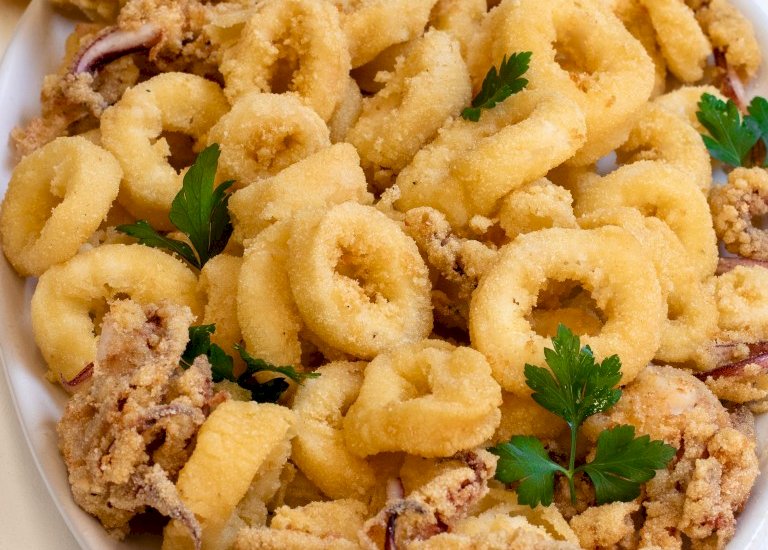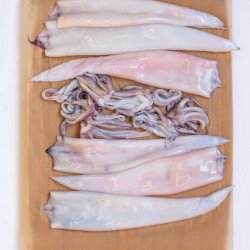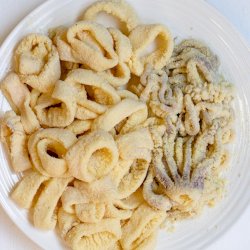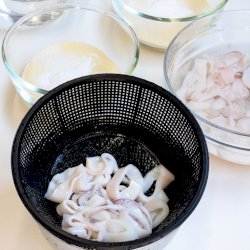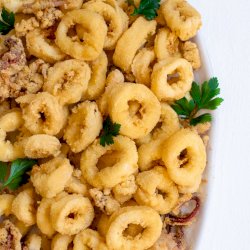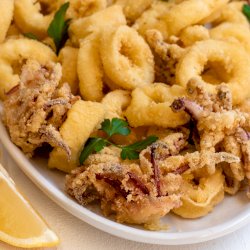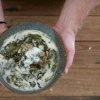Crispy Fried Calamari
Crispy Fried Calamari
To get this crispy fried calamari ready firstly decide which type of calamari you’ll be using, fresh or frozen. Either way you will get a crispy coating and you’ll be completely addicted! Each time I’ve prepared this for the family it is completely polished off!
The best coating ingredient
I tried a number of different ingredients to find the one that would achieve a crispy fried calamari. Ingredients included coating the calamari with flour, bread crumbs and semolina but also using combinations of them. My favourite one was using a double coating of just semolina with my least favourite being a coating of breadcrumbs.
With my method, I dip the calamari in semolina twice, with just water being the binding agent. A single coating of semolina will help crisp up the calamari as well but I preferred it with the double coating. You may try it both ways and decide what you and your family prefer!
As far as the flavourings added to the coating, I just used salt and black pepper. But there have been occasions where I’ve added other spices like sumac for the extra zestiness or dried oregano and paprika. This part is entirely up to your individual preferences.
Frozen vs Fresh Squid
The differences between frozen and fresh squid as far as the cooking process is concerned are:
-With the fresh squid you need to account for the preparation it requires to remove all the unnecessary parts of it. Whereas frozen you just have to thaw it. Hence more effort and time are required when using the fresh squid unless your fishmonger does that for you.
-I found that the fresh calamari rings formed were a bit thinner than the frozen variety but that will vary depending on what you find at the store. So, for me, it meant that the fresh calamari rings needed just a bit less time to cook.
Fresh Squid preparation
Below is a video I recorded on my phone to show you the process of preparing the fresh squid. After you prepare the squid by removing all the unnecessary parts, like in the video, the squid needs to be well washed inside and out.
My cooking tips
Cooking this crispy fried calamari a number of times I have been following some important guidelines to ensure I get the best result possible:
-The cooking oil needs to be very hot before frying the calamari, or else the calamari will absorb too much oil and will turn out too soft.
-The frying pan should be not overcrowded so that the temperature remains as high as possible. Otherwise, the calamari will absorb too much oil and won’t be as crispy.
-The calamari should not cook for longer than the recommended time as it will be too chewy. The frozen calamari as it seems to be thicker than the fresh calamari I use, usually requires that extra 30sec of cooking. So I tend to fry it for 2min rather than 1.5min.
-When the calamari is removed from the frying pan it is placed on a cooling rack (on top of a baking tray). That will allow the excess oil from the calamari to drip and not be absorbed.
Accompany this crispy fried calamari with a fresh salad and some potatoes or even an easy spinach and rice tray bake!
Crispy fried calamari – using frozen calamari
Prep Time 30 mins
Cook Time 10 mins
Total Time 40 mins
Servings: 4
Ingredients
• 750 g frozen calamari packet
• 3 cups, 500 gr, durum semolina
• 2 1/2 tsp salt
• 3 tsp baking powder
• cracked pepper, to your liking
Instructions
1. Thaw the calamari as per packet instructions. Meanwhile, prepare the coating.
2. Mix the ingredients in one bowl, then split it equally into two bowls. Also fill a bowl with cold water to have on the side.
3. Wash the calamari with cold water, cut it in 1cm rings. The coating process takes some time hence I leave the calamari rings in a bowl with icy cold water and then strain a batch of it at a time to use.
4. The calamari should be strained from excess water but not dried completely as that little bit of water will help the semolina bind.
5. At this stage have the strained calamari, the two semolina bowls and the bowl with cold water in front of you. The reason why I have the semolina in two different bowls is so that it doesn’t all get too clumpy with the water dripping in the bowl.
6. First coat the calamari well in the first semolina bowl then quickly dip the calamari into the cold water. The semolina will sort of wash off but some will still be there to increase the surface area. That means that when you dip it into the second semolina bowl the semolina will bind to it a lot better and a thicker coating will form. Set aside on a plate after the second coating and repeat the process with the rest of the calamari.
7. Continue working through the calamari that was left in the icy cold water and before the process is finished prepare the frying pan. Heat a frying pan on high with enough olive oil at least 2cm in height. Fry the calamari in small batches once the oil is hot, for 1.5-2min. Do not let it cook any longer than that as the calamari will be too chewy.
8. Use a slotted spoon to pick up the cooked calamari and place it on a cooling rack. The cooling rack should be placed on top of a baking tray so that the oil can drip on it rather than being absorbed by the calamari. That will also mean that the bottom of the calamari isn’t moist and the crispiness is maintained.
9. Serve the calamari hot with some lemon wedges.
Recipe Notes
Serving size may vary depending on what other dishes may be also served.
Preparation time includes the time needed to thaw, wash and coat the calamari.
Because the frozen calamari is a bit thicker than the fresh calamari and also because there is a double coating i tend to cook it for 2min rather than 1.5min.
Crispy fried calamari – using fresh calamari
Prep Time 1 hr
Cook Time 10 mins
Total Time 1 hr
Servings: 4
Ingredients
• 1.2 kg fresh squid
• 3 cups durum semolina, 500g
• 2 ½ tsp salt
• 3 tsp baking powder
• cracked pepper to your liking
Instructions
1. Firstly to prepare the squid remove the wings by pulling them off. The rest of the skin will peel off as well.
2. Next remove the head by holding the body and gently pulling the head out. With it take out the intestine, any wastes and the clear skeleton.
3. Set aside the cleaned-out body and then hold onto the squid’s head, flip it, squeeze out the ink sac and cut it off in the middle and keep the tentacles while discarding the rest. If the squid is too narrow to rinse it inside properly then clean it out after you cut it into rings.
4. Wash the calamari with cold water, cut it in 1cm rings. The coating process takes some time hence I leave the calamari rings in a bowl with icy cold water and then strain a batch of it at a time to use.
5. Mix the rest of the ingredients in one bowl, then split it equally into two bowls. Also fill a bowl with cold water to have on the side.
6. The calamari should be strained from excess water but not dried completely as that little bit of water will help the semolina bind.
7. At this stage have the strained calamari, the two semolina bowls and the bowl with cold water in front of you. The reason why I have the semolina in two different bowls is so that it doesn’t all get too clumpy with the water dripping in the bowl.
8. First coat the calamari well in the first semolina bowl then quickly dip the calamari into the cold water. The semolina will sort of wash off but some will still be there to increase the surface area. That means that when you dip it into the second semolina bowl the semolina will bind to it a lot better and a thicker coating will form. Set aside on a plate after the second coating and repeat the process with the rest of the calamari.
9. Continue working through the calamari that was left in the icy cold water and before the process is finished prepare the frying pan. Heat a fry pan on high with enough olive oil at least 2cm in height. Fry the calamari in small batches once the oil is hot, for 1-2min. Do not let it cook any longer than that as the calamari will be too chewy.
10. Use a slotted spoon to pick up the cooked calamari and place it on a cooling rack. The cooling rack should be placed on top of a baking tray so that the oil can drip on it rather than being absorbed by the calamari. That will also mean that the bottom of the calamari isn’t moist and the crispiness is maintained.
11. Serve the calamari hot with some lemon wedges.
Recipe Notes
Serving size may vary depending on what other dishes may be also served.
Preparation time includes the time needed to prepare, wash and coat the calamari.

